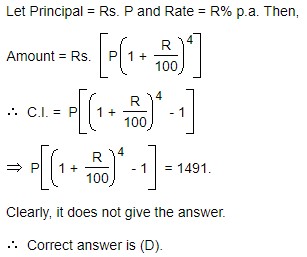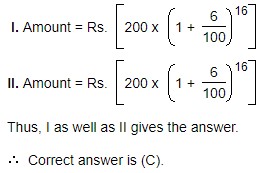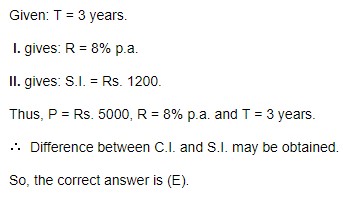Directions to Solve
Each of the questions given below consists of a statement and/or a question and two statements numbered I and II given below it. You have to decide whether the data provided in the statement(s) is/are sufficient to answer the given question. Read both statements and
- Give answer (A) if the data in Statement I alone are sufficient to answer the question, while the data in Statement II alone are not sufficient to answer the question.
- Give answer (B) if the data in Statement II alone are sufficient to answer the question, while the data in Statement I alone are not sufficient to answer the question.
- Give answer (C) if the data either in Statement I or in Statement II alone are sufficient to answer the question.
- Give answer (D) if the data even in both Statements I and II together are not sufficient to answer the question.
- Give answer(E) if the data in both Statements I and II together are necessary to answer the question.
1. What is the rate of compound interest?
I. The principal was invested for 4 years.
II. The earned interest was Rs. 1491.
A. I alone sufficient while II alone not sufficient to answer
B. II alone sufficient while I alone not sufficient to answer
C. Either I or II alone sufficient to answer
D. Both I and II are not sufficient to answer
E. Both I and II are necessary to answer
2. What will be the compounded amount?
I. Rs. 200 was borrowed for 192 months at 6% compounded annually.
II. Rs. 200 was borrowed for 16 years at 6%.
A. I alone sufficient while II alone not sufficient to answer
B. II alone sufficient while I alone not sufficient to answer
C. Either I or II alone sufficient to answer
D. Both I and II are not sufficient to answer
E. Both I and II are necessary to answer
3. An amount of money was lent for 3 years. What will be the difference between the simple and the compound interest earned on it at the same rate?
I. The rate of interest was 8 p.c.p.a.
II. The total amount of simple interest was Rs. 1200.
A. I alone sufficient while II alone not sufficient to answer
B. II alone sufficient while I alone not sufficient to answer
C. Either I or II alone sufficient to answer
D. Both I and II are not sufficient to answer
E. Both I and II are necessary to answer


